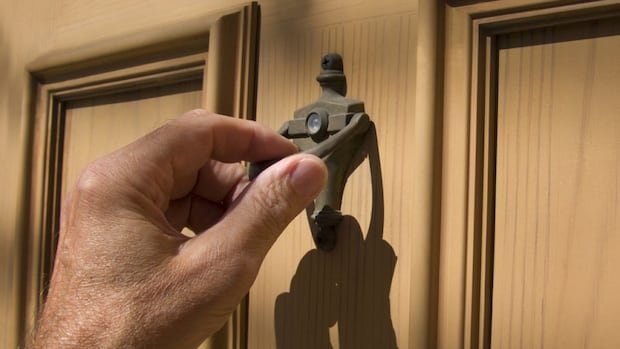Cost of LivingWho’s that knocking at my door?
Sure, we live in the digital age. But when most of us ignore phone calls and send emails straight to spam — why are door-to-door salespeople still getting through?
If you get an unexpected knock on the door, it’s probably somebody trying to sell you something.
Canada is one of the top ranking countries in the world for door-to-door sales, also known as direct selling, with more than one million independent sales consultants.
That’s how Brendan Quinlan primarily finds work for his pest removal business, Insight Pest Solutions. He says when his sales representatives reach out directly to potential clients, it can give him a competitive edge over larger companies with massive marketing budgets.
“We’re only going to be one of a handful of people that physically come to their door to talk to them about a service,” he told CBC Radio’s Cost of Living.
Quinlan says talking to someone face-to-face lets them fact-check his sales pitch in real-time, letting him directly respond to questions.

“Most people, when we knock on their door, their phone’s in their hands. So they’re going online to check out and to ensure what you are saying is true,” Quinlan said.
That accountability may have an advantage over other kinds of marketing today, as stories of bad actors scamming Canadians out of hundreds of thousands of dollars aren’t hard to find.
For the first six months of this year, the Canadian Anti-Fraud Centre heard from 677 victims of bank impersonation scams and recorded $11.7 million in losses. Claudiu Popa, co-founder of the KnowledgeFlow Cybersafety Foundation, says Canadians are falling for these scams because they don’t recognize the warning signs.
Popular schemes have involved landscaping, fundraisers, distressed family members and cryptocurrencies. Scammers often target their victims using email, text, or social media, which spreads distrust of marketing by phone and online advertising.
Door-to-door sales may seem old-fashioned — but those in the industry say it’s survived, and maybe even continues to thrive because it helps build sellers’ interpersonal skills and can foster trust between themselves and their clients.
Opening the door to connection
Nicole Rourke, a marketing professor at St. Clair College in Windsor, Ont., says humans innately want to connect, and gestures like handshakes and eye contact are important for building a rapport before giving anyone their money.
“I think that there is a need for people to really want to feel like they can trust somebody and face-to-face is the best way to establish that trust,” Rourke said.

She says trust is particularly important when it comes to expensive purchases.
“It’s much harder to say no to somebody in-person. It’s easier to abandon your shopping cart online, ignore emails and social media posts than it is to ignore somebody that’s standing right at your doorstep,” Rourke said.
In Ontario, Quebec and Alberta, it’s illegal to sell home heating and cooling equipment unsolicited in most cases due to aggressive and misleading business practices. Some jurisdictions require door-to-door salespeople to be licensed and follow other restrictions.
Face-to-face advantage
Owen Chilvers is currently a Dalhousie University student, he owns and operates Halifax Student Painters, which employs around 450 sales associates this summer.
As soon as he arrives at a property, he’ll ask the owner questions about the house — things like the decks, vinyl sidings and trims — to get a sense of what the people’s needs might be before making offers.
“You never know when the iron’s about to strike, so you just gotta keep pursuing forward, no matter what. And a lot of people don’t have the motivation,” he said.
Even then, he stresses it’s important not to be pushy or try to sell someone something they don’t need; he knows that door-to-door sales reps are sometimes seen as intimidating or known for using high-pressure sales tactics.

Quinlan’s employees are seasonal, and during the summer months he typically hires university students for work. He says door-to-door sales are better suited to their lifestyles and energy levels than older adults.
He says many of his employees are studying business and look at the job as an opportunity to sharpen skills that will give them a competitive advantage in their careers.
“Our program is focused on training [students on] how to communicate effectively, meta-verbal communication, eye contact, pitch and tone; all of that good stuff,” Quinlan said.
Since door-to-door businesses often work on a commission-based sales model, Quinlan argues the sink-or-swim environment is good training for a young person hoping to become an entrepreneur.
Rourke added that it also helps develop practical social skills — like handling rejection, a tough lesson that’s important for anyone aspiring to have a career in sales.
Gen Z graduates between the ages of 15 and 24 are facing the highest unemployment rate the country has seen in decades, apart from the pandemic. CBC’s Paula Duhatschek breaks down what’s behind the surge and what it could mean for a whole generation of Canadians.
According to a 2022 report from Direct Sellers Association of Canada, an industry advocacy group, more people were interested in working in direct sales that year compared to 2021. Students, women and people aged 18-44 were most likely to show interest in the work.
“More students are willing to try this. And I think part of that is, jobs for young people are harder to come by and it’s challenged people to think outside the box,” Quinlan said.
Aside from the pandemic, Canada’s youth are currently experiencing the highest levels of unemployment since May 2009, during the financial crisis. According to Statistics Canada, the unemployment rate for returning students aged 15 to 24 was 20.1 per cent in May.
Building a future
Chilvers set a goal to spend over 1,000 hours painting his clients’ homes this season. He says sometimes he works 10-hour days and that the job is “not for the weak.”
“You have got to have a positive mindset going to every single door to be able to get the results you want,” he said.
He says a lot of his doorknockers quit because they found the job too tough or weren’t seeing the money straight away.
But the first-year commerce student says he wants to continue his entrepreneurial path and own a business in the future.
Chilvers is unsure what field he wants to enter but he says he’s dreaming big — and hopes his door-to-door experience helped him gain invaluable experience.
“You want to shoot as high as you can and owning that business is a way to give yourself financial freedom,” he said.





